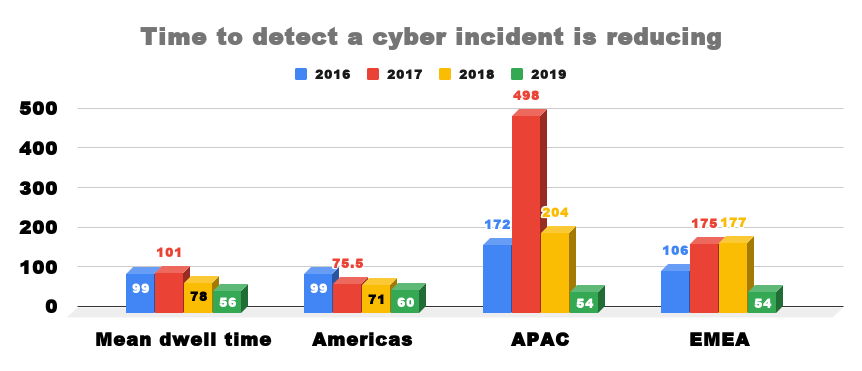
Organisations in Europe, Middle East and Africa (EMEA) are two days better than the global average of 56 days to detect a cyber incident as organisations are detecting and containing attacks faster.In EMEA the median dwell time fell by 69.5% to 54 days in 2019 compared to 177 days in 2018.FireEye Mandiant M-Trends 2020 Report showed that organisations have put more emphasis on GDPR and increasing focus on security due to the ongoing challenges organisations face from sophisticated threat actors.The global median dwell time decreased by 28% to 56 days in 2019 compared to 78 days last year.Dwell time is calculated as the number of days an attacker is present in a victim network before they are detected.
The median represents a value at the midpoint of a data set sorted by magnitude.Internal detection, when an organisation independently discovers that it has been compromised, fell 40.6% to 30 days compared to 50.5 days in 2018 while external notification, when an outside entity informs an organisation that it has been compromised, also fell by 23.37% to 141 days compared to 184 days in 2018.For the first time in four years, external notifications exceeded internal detections.FireEye Mandiant M-Trends 2020 Report showed that the shift is potentially due to a variety of factors, such as increases in cybersecurity vendor and law enforcement notifications, the continued expansion of the cybersecurity industry, changes in public disclosure norms and compliance changes.The report showed that over 500 new malware families were observed in 2019, 58% of which were discovered through Mandiant service efforts, including incident responses.The majority of these new samples either impacted Windows or multiple platforms while new malware families, solely impacting macOS and Linux, remain in the minority.Furthermore, 70% of the samples identified belonged to one of the five most frequently seen families, which are based on open source tools with active development.
These points demonstrate that not only are malware authors innovating, cybercriminals are also outsourcing tasks to monetize operations faster.Mandiant researchers analysed the 186 unique malware families from Mandiant engagements this year to reveal six traits and trends.
Traits focus on the malware specifics, such as category, file type, accessibility and obfuscation.
Trends include the top families and how many of them were new in 2019.We have seen organisations largely improving their level of cybersecurity sophistication, but combatting the latest threats is still a huge challenge for them, said Jurgen Kutscher, Executive Vice-President of Service Delivery at FireEye.There are more active groups now than ever before and weve seen an aggressive expansion of their goals.
Consequently, its crucial for organizations to continue building and testing their defences, he said.(Image credit: Future)Given the ease at which ransomware attacks can be carried out and the willingness of victims to pay, FireEye has assessed that threat groups will continue to leverage ransomware as a secondary means for monetising their access to victim environments.The report revealed that the successful monetisation of ransomware attacks and the availability of ransomware as a service have contributed to an increase in ransomware cases.It has also led some established cybercrime groups to turn to ransomware as a secondary means of generating revenue.
In 2019 we saw several cases in which threat actors that historically targeted sensitive information such as personally identifiable information (PII) and credit card information turned to ransomware to monetise access to victim networks, report said.Of the attacks that FireEye Mandiant professionals responded to, the greatest majority (29%) were likely motivated by direct financial gain.
This includes extortion, ransom, card theft, and illicit transfers.
The second most common (22%) was data theft likely in support of intellectual property or espionage end goals.bQXHuL9FnWTzoidAbDo4YE.jpg?#

 17
17







